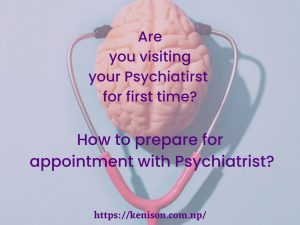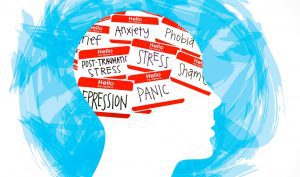Table of Contents
aHow to Prepare for Appointment with Psychiatrist? Are you visiting your psychiatrist for first time?

If it is your first time seeing a psychiatrist, you may be feeling overwhelmed. Seeking help can mean facing unknowns, including a possible diagnosis. Furthermore, trusting a practitioner with your mental and emotional well-being is unique.
You can receive support from your loved ones, but they cannot treat you. Therefore, your psychiatrist is a vital part of your health care process.
If you prepare before your appointment, you’ll be able to speak confidently because you are the expert on your own health.
You are the best person to express your goals, values, and preferences, and you have a right to be an active participant in your care. It is believed that patients’ active involvement in their health care may lead to improved outcomes.
Appointment with Psychiatrist: How to find out best Psychiatrist for you?
Referrals from friends, family, or a Talk Therapist are effective ways of finding a qualified psychiatrist. The Internet offers a wide variety of online directories, such as those found on mental health websites and publications. Ensure all psychiatrists you consider are qualified by researching their backgrounds and specialties.
Considering your Medical history and Past Mental health issues:

Getting your complete medical history together might be helpful before visiting a psychiatrist. Be prepared to share any previous diagnoses, symptoms, and medication regimens from the past and present (including the doses, time periods, and side effects).
In case you are unsure about your medical history, you can consult your pharmacist or the clinician who prescribed past medications.
appointment with psychiatrist: Shared decision-making approach:
Making decisions about your care is a collaborative process called shared decision-making (SDM). It requires psychiatrists, chosen family members, and patients to reach a mutual agreement about treatment plans.
In the end, this approach assumes “two experts”: the psychiatrist with specialized medical knowledge and the person with lived experience, values, preferences, and goals.
Assure your provider that they will include your thoughts and expertise in the decision making process. By understanding how you will be involved in your treatment plan, you can determine if this provider is right for you.
Is the Psychiatrist or other mental health professional involved in your treatment fit for you?
You probably don’t feel comfortable with everyone you meet. The same is true when working with mental health professionals. It often takes a few meetings to figure out whether you feel comfortable enough to work with someone.
The quality of the therapeutic relationship, such as warmth, interest, and responsiveness to your needs, has been shown to improve outcomes in psychotherapy. Consider whether you feel comfortable with your psychiatrist after a few appointment.
Good relationship with your treating Mental health professional:
Ask yourself:
- Did you feel you comfortable talking to them?
- Did you feel like they cared about what was important to you?
- Did you feel like you could express what was important to you?
If the psychiatrist seems to have difficulties in these areas, he or she may not be the right psychiatrist for you. Describe your concerns to your psychiatrist and consider switching to another doctor if that would be more beneficial.
For effective relationship fit:
In order to be effective, a psychiatrist must be willing to answer any questions you may have – respectfully.
Some possible questions:
- What is your treatment approach?
- How can I be involved in my care?
- I would like to be treated to achieve my life goals rather than to address symptoms. What do you think of this approach?
- What are my medication options? Can you thoroughly explain each one, including what symptoms they will treat?
- Can you carefully explain any side effects, including physical impacts, such as sedation or weight gain or activity restrictions such as alcohol consumption?
- How can side effects be addressed? Are there any adverse impacts with the other medications I am on (if applicable)?
- Are you available outside appointments to address medication and other concerns, such as refills and emergencies? What’s the best way to reach you?
- Are you able to recommend additional resources that might be helpful for me?
Keeping records:
Keep a diary of your moods, triggers, symptoms, medication observations, and self-care practices between appointments. These trends can be useful for evaluating progress between appointments with your doctor. Additionally, you can use this information to prepare a list of discussion points for your next meeting.
A meaningful relationship with your psychiatrist is critical to receiving the best care possible. Your psychiatrist’s role is to share their expertise to guide you on your journey, but for the best results, this relationship requires your effort and preparation as well.
For detail information:
MD, Psychiatry (IOM,TUTH)
9851096229
9765024111
01-5553097, 9861508888

Dr. Kenison Shrestha, Psychiatrist – Mental Health Clinic

Dr. Kenison Shrestha, Psychiatrist – Mental Health Clinic
Recent Comments